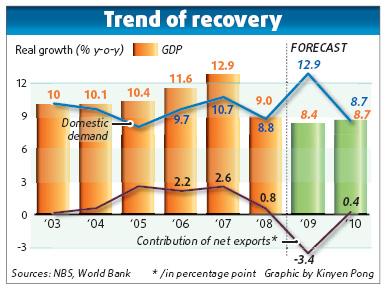
The World Bank yesterday revised upwards its forecast for China's growth this year - from 7.2 percent to 8.4 percent - and projected a slightly faster pace of expansion in the coming year.
The Washington-based bank was the latest major international financial institution to upgrade predictions - a reflection of its confidence in the country's recovery.
But the World Bank sounded a note of caution, pointing out that a sustained recovery will need a shift in the economy to emphasize consumer spending, instead of industry and investment.
Eight months ago, when China's exports were plunging sharply and its massive stimulus package had not yet had an impact, the World Bank projected this year's growth would be 6.5 percent. In June, it upgraded that forecast to 7.2 percent.
The latest economic data from the third quarter shows China has already outperformed those expectations.
The World Bank's forecast of 8.7 percent growth in 2010 remains unchanged.
The upgrade follows similar moves from the International Monetary Fund and the Asian Development Bank.
The World Bank admitted that the previous lower projections were down to an underestimation of China's subsequent efforts to mobilize its massive stimulus package.
However, the bank believes "the growth impact of the government stimulus is set to decline sharply next year and investment in parts of manufacturing is likely to remain under pressure from spare capacity in China and abroad."
"Now, all of a sudden, international financial institutions are bullish about Chinese economic performance," said Liu Yuhui, director of the Center for Chinese Economic Evaluation at the Chinese Academy of Social Sciences.
Liu pointed out that the Chinese government may become more tolerant of a possible economic slowdown in the coming year.
"The State Council has recently pledged to balance the relationship between boosting growth and rebalancing the economy. The effort to rebalance the economy will likely bring about economic slowdown," Liu said. "If the government is truly committed to rebalancing the economy, it should tolerate slower growth and it may not be so keen to achieve the 8 percent growth rate."
With more robust data likely to follow, the Chinese government may now consider withdrawing some of its pro-growth policies, said Louis Kuijs, senior economist with the World Bank in China and the main author of the China quarterly update.
He said monetary policy should lead tightening efforts in 2010.
"Risks of asset price bubbles and misallocation of resources amid abundant liquidity need to be mitigated and the overall monetary stance will have to be tightened, eventually," said Kuijs.
Chinese banks have started to rein in new lending, though experts say easy credit will likely continue.
Banks lent about 1 trillion yuan ($125 billion) per month earlier this year. That rate has slowed by about a half since July.





